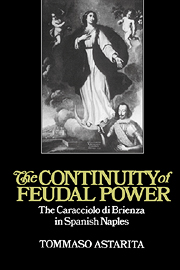Book contents
- Frontmatter
- Contents
- List of plates, figures, and maps
- List of tables
- Acknowledgments
- Note on abbreviations and measurements
- Introduction
- 1 The Caracciolo di Brienza
- 2 Structure and evolution of an aristocratic patrimony
- 3 The management of an aristocratic landed patrimony
- 4 The feudal lord and his vassals: between traditional paternalism and change
- 5 Aristocratic strategies for the preservation of family wealth
- 6 Offices, courts, and taxes; the aristocracy and the Spanish rule
- Conclusion
- Glossary
- Appendix on sources
- Bibliography
- Index
- CAMBRIDGE STUDIES IN EARLY MODERN HISTORY
3 - The management of an aristocratic landed patrimony
Published online by Cambridge University Press: 28 August 2009
- Frontmatter
- Contents
- List of plates, figures, and maps
- List of tables
- Acknowledgments
- Note on abbreviations and measurements
- Introduction
- 1 The Caracciolo di Brienza
- 2 Structure and evolution of an aristocratic patrimony
- 3 The management of an aristocratic landed patrimony
- 4 The feudal lord and his vassals: between traditional paternalism and change
- 5 Aristocratic strategies for the preservation of family wealth
- 6 Offices, courts, and taxes; the aristocracy and the Spanish rule
- Conclusion
- Glossary
- Appendix on sources
- Bibliography
- Index
- CAMBRIDGE STUDIES IN EARLY MODERN HISTORY
Summary
Loda i gran campi e il piccolo coltiva
(Praise the large fields and cultivate the small).
N. C. Onorati, Dell'agricoltura practica (1813) cited by Marino, Pastoral Economics, p. 336Aristocratic wealth has been the object of attention of many historians of early modern Europe, both in general works and in monographs on the nobility of specific regions or times. These studies, and others which have looked at series of data on tithes or taxes on land, have offered essential information on revenues and agricultural production. However, because they focus on other aspects of the history of the aristocracy, such as consumption or urban life, and because of lack of documentation, these studies have often failed to provide a detailed analysis of the management methods employed by the landowning elite. It is nonetheless possible to draw a few conclusions from the extant literature that are valid for most, if not all, of Western Europe: aristocratic landowners in the sixteenth to eighteenth centuries did not manage directly any significant part of their estates through the employment of wage labor, but preferred to rent the land and all other sources of revenues, either separately or in block. Moreover, whatever the origins of their wealth, they were reluctant to reinvest their revenues in order to improve their land, thereby earning the condemnation of many economic historians, who consider increases in productivity the crucial mark of successful management.
- Type
- Chapter
- Information
- The Continuity of Feudal PowerThe Caracciolo Di Brienza in Spanish Naples, pp. 68 - 107Publisher: Cambridge University PressPrint publication year: 1991



